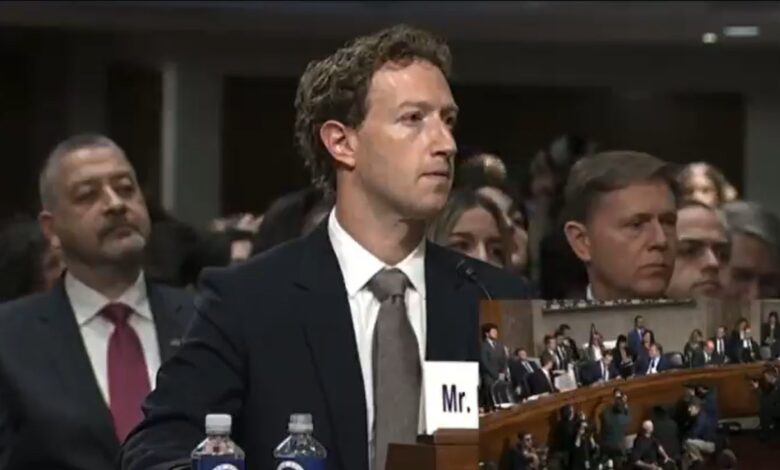Fiery Debate Erupts in Senate Hearing on Big Tech’s Impact on Children, Mark Zuckerberg Cornered

A Senate hearing, which aimed to address concerns surrounding online harms to children, concluded with a call for accountability within the space of Big Tech.
Chairman Durbin emphasized the urgency, stating that America stands at “a moment of reckoning” regarding the power obtained by tech giants like Facebook’s Meta and stressed the necessity of legislative action to address it.
“With a deep understanding of the challenges faced by our youth, we recognize that they cannot navigate these treacherous waters alone,” Chairman Durbin declared. “They are looking to us, as much as they are looking to the industry, to do what is right.”
Senator Blackburn delivered a hard critique aimed at Meta’s Mark Zuckerberg, questioning the platform’s tolerance for predatory content. Referencing a Wall Street Journal article from June 2023 that exposed Instagram’s facilitation of a “vast pedophile network,” Blackburn accused Meta of essentially being “the largest sex trafficking organization in the world.” Zuckerberg dismissed her claims as “ridiculous.”
Blackburn concluded her remarks by asserting that Meta and other tech companies have a responsibility to cooperate with Congress, emphasizing that past voluntary efforts have fallen short. “Your battalion of lawyers consistently obstructs bipartisan legislation,” she said. “It’s time to cease lobbying against the measures discussed in this hearing. Our children’s lives are at stake.”
Senator Blackburn also highlighted an internal Meta email, unearthed during legal proceedings, revealing the company’s dehumanizing perspective on younger users as mere financial assets. Acknowledging teenagers present at the hearing, Blackburn commended their protest against such valuation, gaining immense applause from the audience.
According to The Guardian, New Mexico Attorney General Raúl Torrez also condemned Meta as the “single largest marketplace for paedophiles,” citing an ongoing lawsuit alleging the company’s complicity in child exploitation.
Moreover, Senator Josh Hawley confronted Zuckerberg over Meta’s dismissal of scientific evidence linking social media use to adverse mental health effects. Citing internal research contradicting the CEO’s claims, Hawley emphasized the need for accountability.
Here is a glimpse of the conversation that took place:
Hawley: “Mr. Zuckerberg, let me start with you. Did I hear you say in your opening statement that there’s no link between mental health and social media use?”
Zuckerberg: “Senator, what I said is I think it’s important to look at the science. I know people widely talk about this as if it’s something that’s already been proven. And I think that the bulk of the scientific evidence does not support that.”
Hawley: “Really? Let me just remind you of some of the science from your own company. Instagram studied the effect of your platform on teenagers. Let me just read you some quotes from the Wall Street Journal’s report on this. Company researchers found that Instagram is harmful for a sizable percentage of teenagers, most notably teenage girls. Here’s a quote from your own study. “We make body image issues worse for one in three teen girls.” Here’s another quote: teens blamed Instagram, this is your study, for increases in the rate of anxiety and depression. This reaction was unprompted and consistent across all groups. That’s your study.
Zuckerberg: “Senator, we try to understand the feedback and how people feel about the services we can improve it.”
Hawley: “Your own study says that you make life worse for one in three teenage girls; you increase anxiety and depression. That’s what it says, and you’re here testifying to us in public that there’s no link. You’ve been doing this for years. For years, you’ve been coming in public and testifying under oath that there’s absolutely no link. Your product is wonderful. The science is nascent. Full speed ahead while internally you know full well your product is a disaster for teenagers.”
Snapchat CEO Evan Spiegel also faced tough questioning from Senator Laphonza Butler regarding the platform’s alleged role in facilitating underage access to illegal drugs. Spiegel expressed remorse for the tragedies but emphasized Snapchat’s efforts to combat drug-related content and educate users on the dangers of substance abuse.
Moreover, Republican Senator Tom Cotton directed xenophobic inquiries at TikTok CEO Shou Zi Chew, probing his allegiance and insinuating censorship by the Chinese-owned platform.
It is worth noting that things happen differently in the crypto world, as the Binance case sets the stage for discussing how legal obligations vary across industries. For instance, when former Binance CEO CZ was obliged to stay in the US until his hearing, it highlighted the strict enforcement within the cryptocurrency sector. However, comparing this with the relatively lenient treatment of big tech executives, who are often free to roam despite the harm their platforms may cause, highlights the contrast in regulatory approaches.
Why this difference? Shouldn’t all individuals who make mistakes be treated equally?





